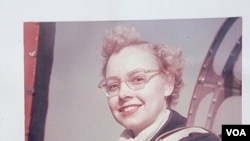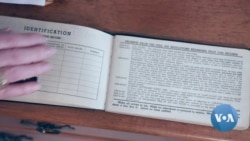Just 25 years ago, women were not allowed to fly battle planes nor operate tanks. Yet, despite generations of physical and cultural obstacles, women have been drawn to the military.
For Libby Haynes, 92, planes have been a passion for over 75 years. When her mother gave her $10 as a birthday gift for her 17th birthday, Haynes knew what to do.
"I had a flying lesson, I spent $6 to rent a Piper Cub for an hour, $3 for an instructor for an hour and a dollar for the logbook," she recalls.
In 1945 young Libby had already finished a training course of the Civil Air Patrol Cadet Program and became a nurse. But after WWII she decided to head back into the sky.
"I just had a very very strong calling it's the only name I can put to it that I was meant to join the Air Force. I don't know whether you say divine guidance or what, but it was the best decision I ever made in my life!" she says.
WATCH: Iuliia Iarmolenko's video report
The U.S. Army did not enlist women into active military service until 1972 but before that Haynes was an aerographer - the Navy's meteorological and oceanographic experts who monitor, collect and record weather condition data. At the same time, she flew with the Civil Air Patrol and managed to buy her own tiny plane that she used to fly home for the weekend.
"I still had a student license when I bought that PG-23 Surplus for $500, which was two months' salary!" she says.
The job brought Haynes more than just professional satisfaction it is there that she met her husband, a pilot. When she became pregnant, one of her colleagues reported it to the senior officers and Haynes was discharged.
But it wasn't anything personal, explains Marilla Cushman from the Women In Military Service For America Memorial.
"There was a time where if you had children, if you became pregnant whether you were married or not you had to get out," she says.
Cushman joined the military in the 70s, but just like Haynes, was unable to do what she wanted to.
"I was disappointed that I couldn't do more, that I couldn't do some of the other things that the guys were doing," she says.
In mid 1970s the rules changed and women were allowed to pilot noncombat planes. After the Gulf War of 1990-1991, that limitation was also lifted. Cushman believes the U.S. Army simply realized it needed women.
"Particularly during the global war on terror, we started bringing women in, attaching them to infantry units and special forces units because as these units went into Afghanistan and Iraq because of the cultural issues," she says. "It just became clear that we couldn't manage without women across the board."
Today women in the U.S. military make up 14% of the personnel. But it took years of fighting to get to that point.
"Let the generations know that women in uniform also guaranteed their freedom," Cushman says. " That our resolve was just as great as the brave men who stood among us."
Both Cushman and Haynes say they are happy to see the position women enjoy in the U.S. military today. Though Haynes confesses, she never really took any of limitations seriously.
Anna Rice contributed to this report






